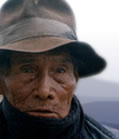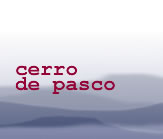 |
 |
||
 |
|||
|
RELATED THEMES migration social change OTHER LOCAL THEMES BACKGROUND |
communications
A number of narrators talk of how the old farming communities were quite isolated and had little contact with modern or urban Peru, except what they could glean from the radio. Today, widespread access to television and several new radio stations, as well as greatly increased urban migration within families, has broken down that sense of isolation. Some of the older people feel that this has led to the loss of their traditional culture, but several young people say they still appreciate the old songs and dances - it is just that today they can enjoy both modern and traditional music. Transport has improved too, not least as a result of the mining activity, and in one case the narrator says this has brought some prosperity: "Rancas is a busy crossroads. In the past 18 months it's become the main communication thoroughfare with the capital of the province. Rancas has always survived on its livestock, but now.it's become a central point for communications with other villages with so many roads passing though. There's a lot of trade with other villages. This is what I mean when I say things are changing... Rancas is now a key place, better connected with outside - it's moving towards the future" (Peru 1). One man has seen the shift from the main form of transport being livestock, then trains, and now lorries: "We've always had to work with our livestock.with our llamas. That's how we used to work before. Now there's none of this.They transport their minerals and everything in lorries to different places. [We used llamas] to carry minerals. Now there's none of this, everything's just in lorries that's all" (Peru 9). The high altitude caused problems to lowland visitors to the region - as it still does: one man recalls: "The Mining Volcan company worked a deposit in Ticlio. Ticlio was also known for the passenger train crossing which is the highest in the Andes at 4,850 metres above sea level.People from Lima would get soroche (altitude sickness) and they needed oxygen with essences, like thyme oil, or alcohol, etc" (Peru 32). quotes about communications"Life on the big farms marginalises all of us, people often have a battery operated transistor radio so they hear a little local news and music. But we didn't have television, newspapers or magazines. So it was only when I went to Rancas and the city, Cerro de Pasco, that I met another world, other ways of behaving." "I'm a teacher... In my spare time I go to Rancas and we always get involved in the Community's working groups though we have tried hardest to strengthen the media sector. We have bought a transmitter for Rancas. Rancas gets two television channels and we add youth programmes made by our own young people from the Community and the Municipality. We also have an FM radio station and we are working on a project for a 5 to 10kw AM one. Nevertheless, we have a problem with the licence because the government issues them mainly to private companies rather than to community ones. Despite this difficulty we already have funds for the equipment and running of the station which means we will be able to get Radio Rancas on the air again. Radio Rancas was a pioneer in radio in Cerro de Pasco... I think that in a few years time the sound of Radio Rancas will be well heard throughout the central Andes." "The thing is nowadays we do both, the local dances and the modern ones. My parents think we don't do the traditional dances they way they used to but the truth is we dance both... they only used to do traditional local dancing because there was no other music ... It's different now, we do everything, modern music like salsa, chicha, baladas, but young people dance huaynos and huaylas too. My father says it wasn't easy to have a television in their day, whereas now everyone has a television and certainly a radio." ".one of [the old] customs was that the men of the community, well the boys, had to learn to how to handle a horse... they were expected to know how to ride. Nowadays that has pretty much changed, because today boys don't go from Rancas to Cerro by horse. Now they have bicycles, they have mopeds, they even use cars - this has been a big change." |
|